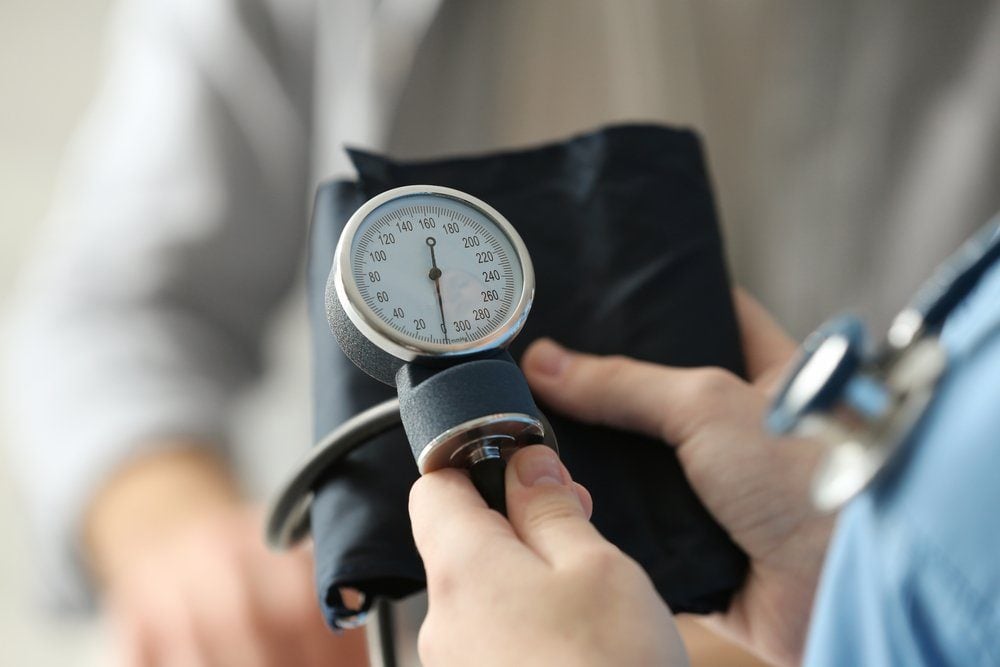
What is ischemic colitis?
Ischemic colitis is kind of like a stroke or heart attack that affects your gut instead of the brain or heart, explains Arun Swaminath, MD, director of the Inflammatory Bowel Disease Program at Lenox Hill Hospital in New York City. Simply, there’s a drop in the blood supply that feeds the gut, causing symptoms such as pain and bloody diarrhea. This condition tends to affect older adults with underlying cardiovascular issues, but the disease also can occur in younger patients due to risk factors like constipation and illicit and prescription drug use.

Low blood pressure
Unlike high blood pressure—known as the silent killer due to the lack of symptoms—low blood pressure has some clear signs, such as dizziness and lightheadedness. This can be an early sign of impending ischemic colitis, says Will Bulsiewicz, MD, a gastroenterologist in Mount Pleasant, South Carolina. When your blood pressure dips, your body kicks into safe mode, he says. “It wants to make sure that it supports the heart and brain so it clamps down on the blood vessels that supply blood to the colon,” he says. In other words, “we sacrifice the colon in favour of heart and brain.”
Check out these foods that lower blood pressure.

Cramping
Ischemic colitis attacks come on quickly. “Warning signs of ischemic colitis include cramping and abdominal pain or tenderness in the abdomen, which usually occurs suddenly and most commonly is on the left side of the abdomen,” says David Greenwald, MD, director of clinical gastroenterology and endoscopy at Mount Sinai Hospital in New York City.
These are the stomach pains you should never ignore.

Nausea
Another silent symptom of ischemic colitis is nausea, Dr. Greenwald says. Nausea also may be a symptom of a heart attack. “Some people also have a feeling of an urgent need for a bowel movement,” he adds.

Diarrhea
Bloody diarrhea commonly occurs along with cramping during an ischemic colitis attack. “People are feeling fine and then all of a sudden there’s pain, and after the pain comes diarrhea that’s often bloody,” adds Dr. Bulsiewicz.
Learn what else your bowel movements can reveal about your health.

Dehydration
Many people don’t pay close enough attention to their fluid intake, and dehydration can contribute to ischemic colitis. “The vast majority of cases are due to dehydration and low blood pressure,” says Dr. Bulsiewicz. “A dry, rubbery tongue and chapped lips are signs of dehydration.”
Here are the surprising signs you need to drink more water.

A change in vital signs
With ischemic colitis, your heart rate goes up and your blood pressure goes down, says Dr. Bulsiewicz, and there may be evidence of urine in your blood. When your kidneys are working hard but they’re not getting enough blood, uremia can occur, he says. That’s when waste products back up into the blood. “These are little clues we see in the lab, and in some cases, they may help us make the diagnosis of ischemic colitis.”
Head to your doctor if you spot these kidney infection signs.

Are you at risk?
People older than 60 are most likely to battle ischemic colitis, although it can occur at any age, says Dr. Greenwald. Other risk factors include inflammation of blood vessels (vasculitis), blood clotting abnormalities, and prior abdominal surgery. “Certain medications have been implicated in causing ischemic colitis (oral contraceptive medications, for example), and it has occurred in long-distance runners.” The good news? Unlike ulcerative colitis, which is chronic, ischemic colitis usually occurs just once. “Most people recover nicely with supportive care including rehydration,” says Dr. Swaminath.
Don’t dismiss these other symptoms that could signal huge health problems.